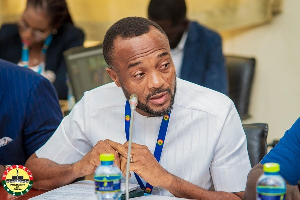Illegal mining, commonly known as galamsey, has long been a significant challenge in Ghana, posing severe environmental degradation, pollution of water bodies, and endangering the livelihoods of local communities. The detrimental effects of these illicit activities have sparked widespread outrage and calls for urgent action to curb the menace.
Amid growing concerns over the devastating impact of illegal mining, on Ghana’s water bodies and forests, the Minister for Lands and Natural Resources, Hon. Samuel A. Jinapor, has assured Ghanaians that the government is ready to take decisive action.
The Minister downplayed suggestions that the government had gone soft on the fight against illegal mining. Instead, he revealed plans for an emergency meeting and the immediate deployment of security forces to affected areas.
“We are going to have a review, and I’m 1,000% certain that we are going to deploy. We are going to ramp up our enforcement measures. So, all these places you are talking about, we are going to have a clean up there.”
Hon. Samuel A. Jinapor, Minister for Lands and Natural Resources
Hon. Jinapor’s recent comments suggested that the government is prepared to take a more aggressive stance this time around. He made clear that security forces would be deployed “within the next 24 hours” and that the government would ramp up its enforcement measures, especially in the Central Region, where illegal mining activities have become rampant.
His statement was assertive, filled with confidence and conviction. “We are going to have a complete swoop,” he declared, assuring the public that the authorities would thoroughly clean up affected areas.
This announcement comes in the wake of mounting public outcry over the environmental degradation caused by galamsey, particularly following a recent statement by the Ghana Water Company Limited.
The company disclosed that it has had to ration water in parts of Cape Coast, Winneba, and Mankessim due to the contamination of water sources by illegal mining activities. This situation has underscored the urgency of the problem, threatening not only the environment but also public health and livelihoods.
While the Minister’s words may offer some relief to those impacted by illegal mining, many Ghanaians are left wondering: will this renewed effort truly make a difference, or is it just more rhetoric?
The Ghanaian public has become increasingly skeptical of government interventions, which often appear to be either poorly enforced or short-lived.
A Persistent and Growing Crisis

The issue of illegal mining has been a persistent problem in Ghana for over a decade. Despite numerous promises, policies, and task forces, galamsey continues to wreak havoc on the country’s natural resources, particularly its rivers and forests.
Water bodies such as the Pra, Offin, and Birim rivers have turned brown and unusable due to the heavy pollution caused by the toxic chemicals used in mining, including mercury and cyanide.
In many regions, particularly the Central, Eastern, and Western regions, once thriving ecosystems have been reduced to wastelands.
In 2017, the government launched a high-profile anti-galamsey campaign, which included the deployment of a joint police and military task force known as “Operation Vanguard.”
However, this effort was soon criticized for being ineffective and riddled with corruption. Allegations emerged that some of the very forces deployed to fight illegal mining were accepting bribes to turn a blind eye to the activity.
Over time, the momentum of the campaign appeared to wane, and illegal mining activities once again intensified, leading many to question the government’s commitment to resolving the issue.
It is clear that if the government is serious about eradicating illegal mining, it must not only increase enforcement but also ensure transparency and accountability. Strong political will, combined with rigorous monitoring mechanisms, is essential.
The deployment of security forces must be backed by a genuine commitment to enforce the law impartially, without the influence of corrupt practices.
The Minister’s announcement that an emergency meeting will take place is a positive step, but it must lead to concrete action. The government must seize this opportunity to demonstrate that it is serious about tackling galamsey once and for all. This is a defining moment, and the public will be closely watching to see if this time will be any different.
READ ALSO: GSE Trading Dips As Market Volume and Turnover Experience Significant Decline





















